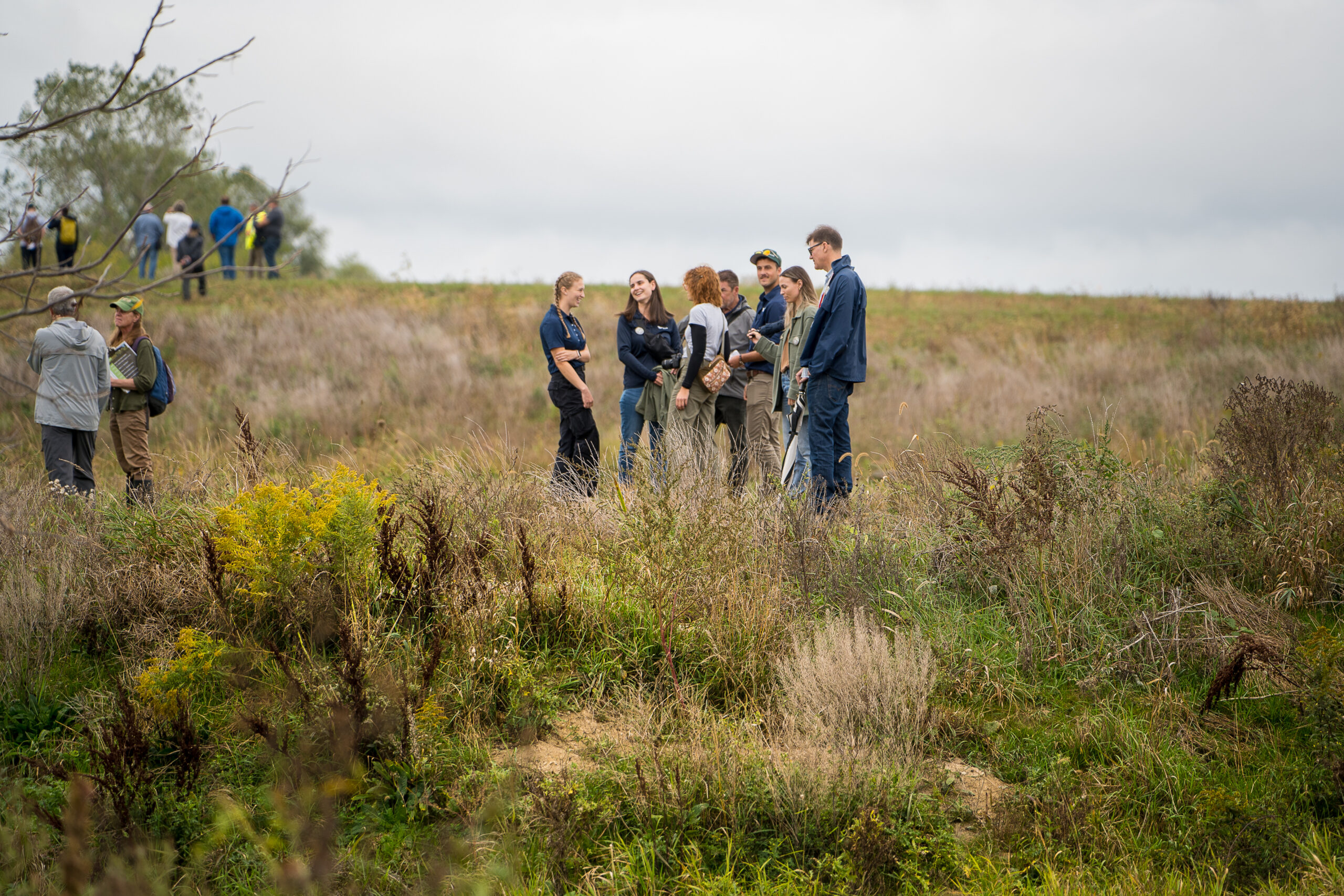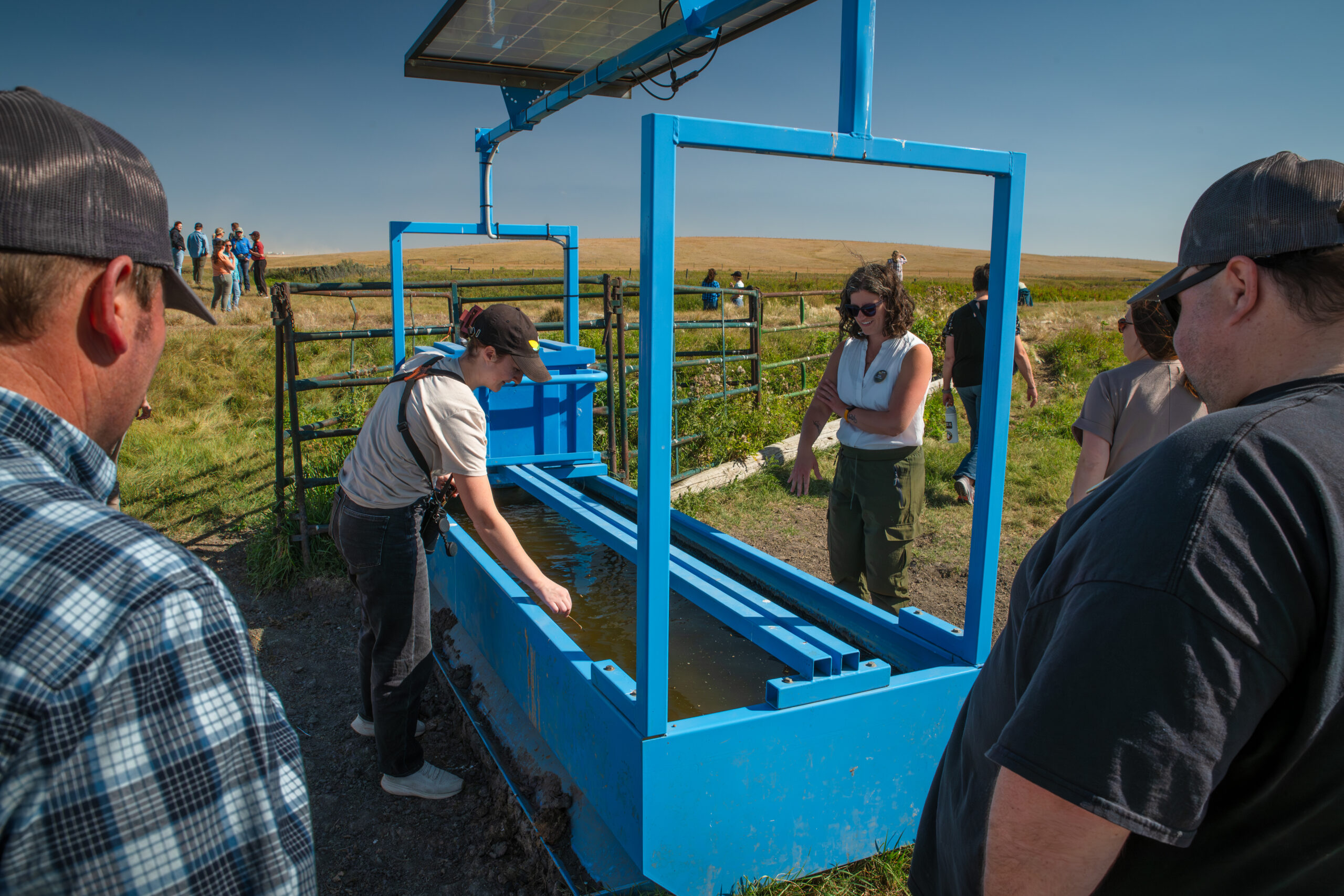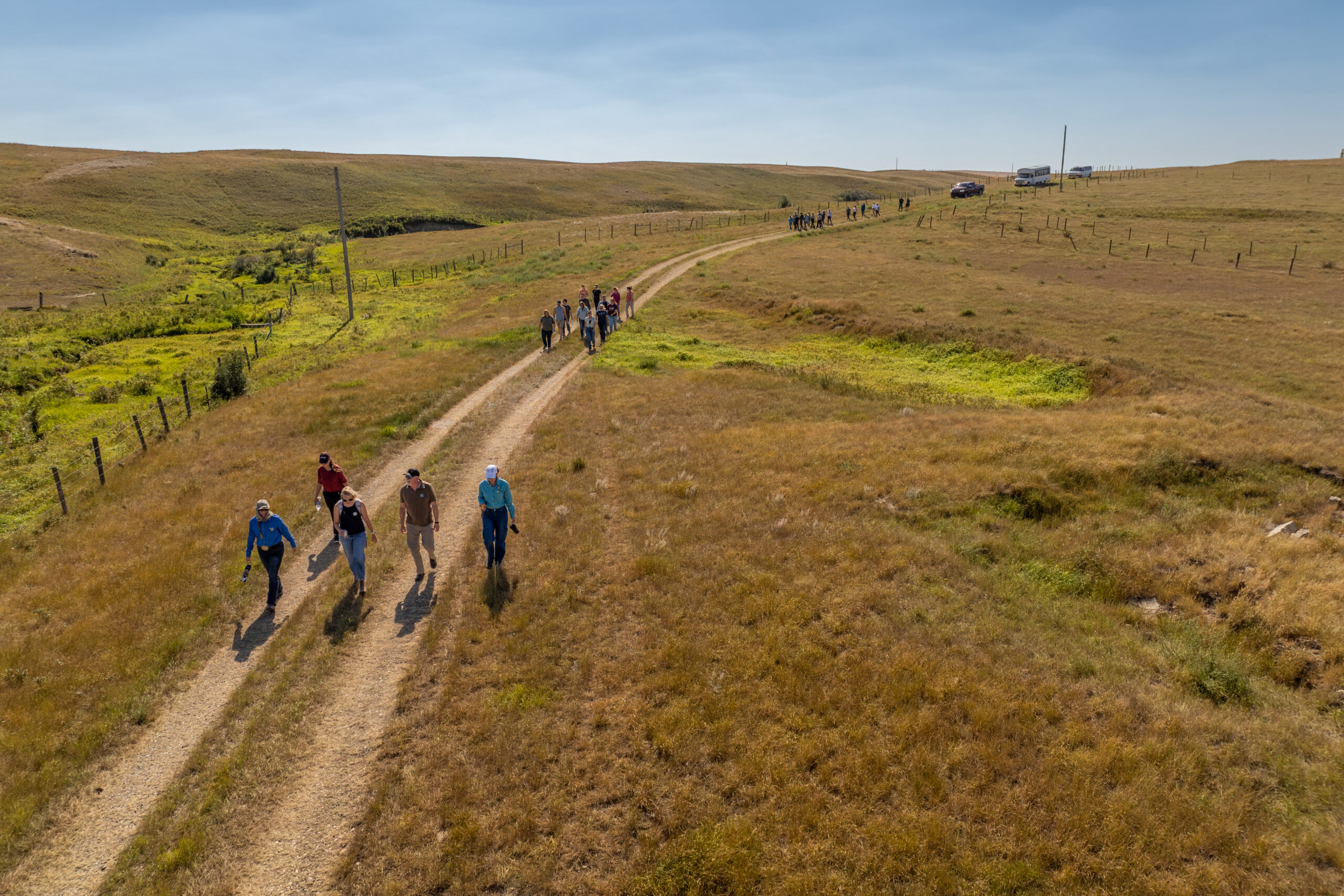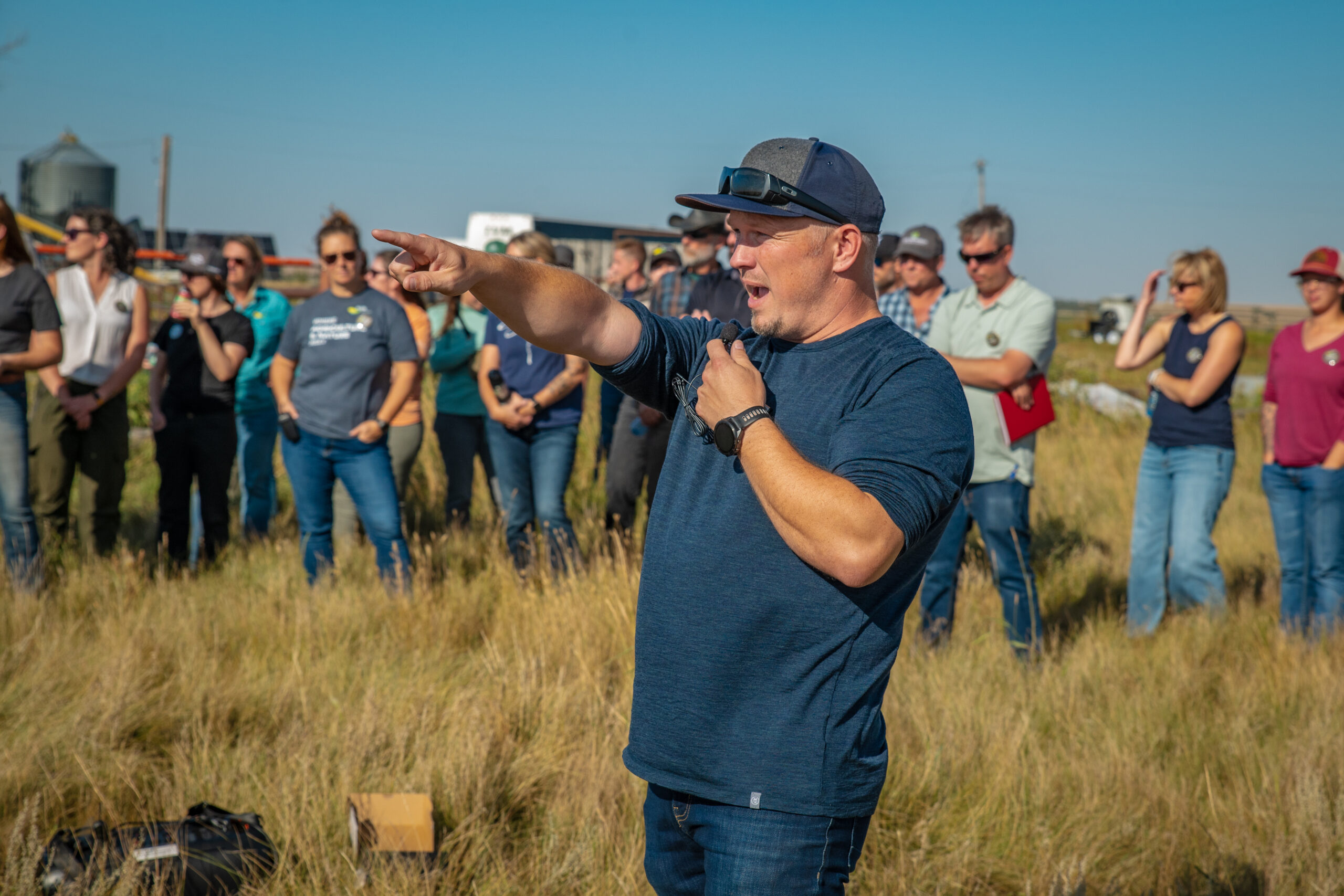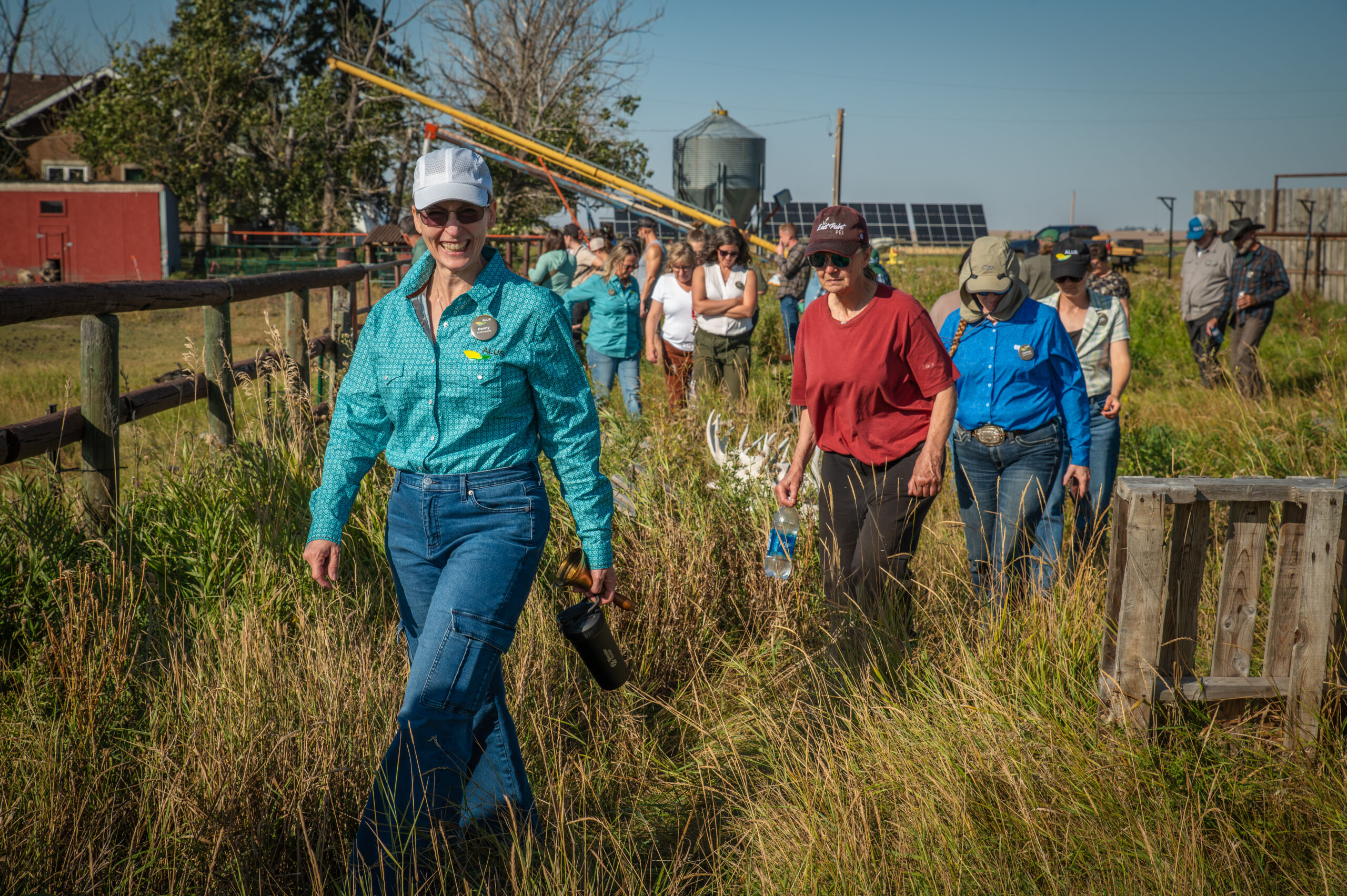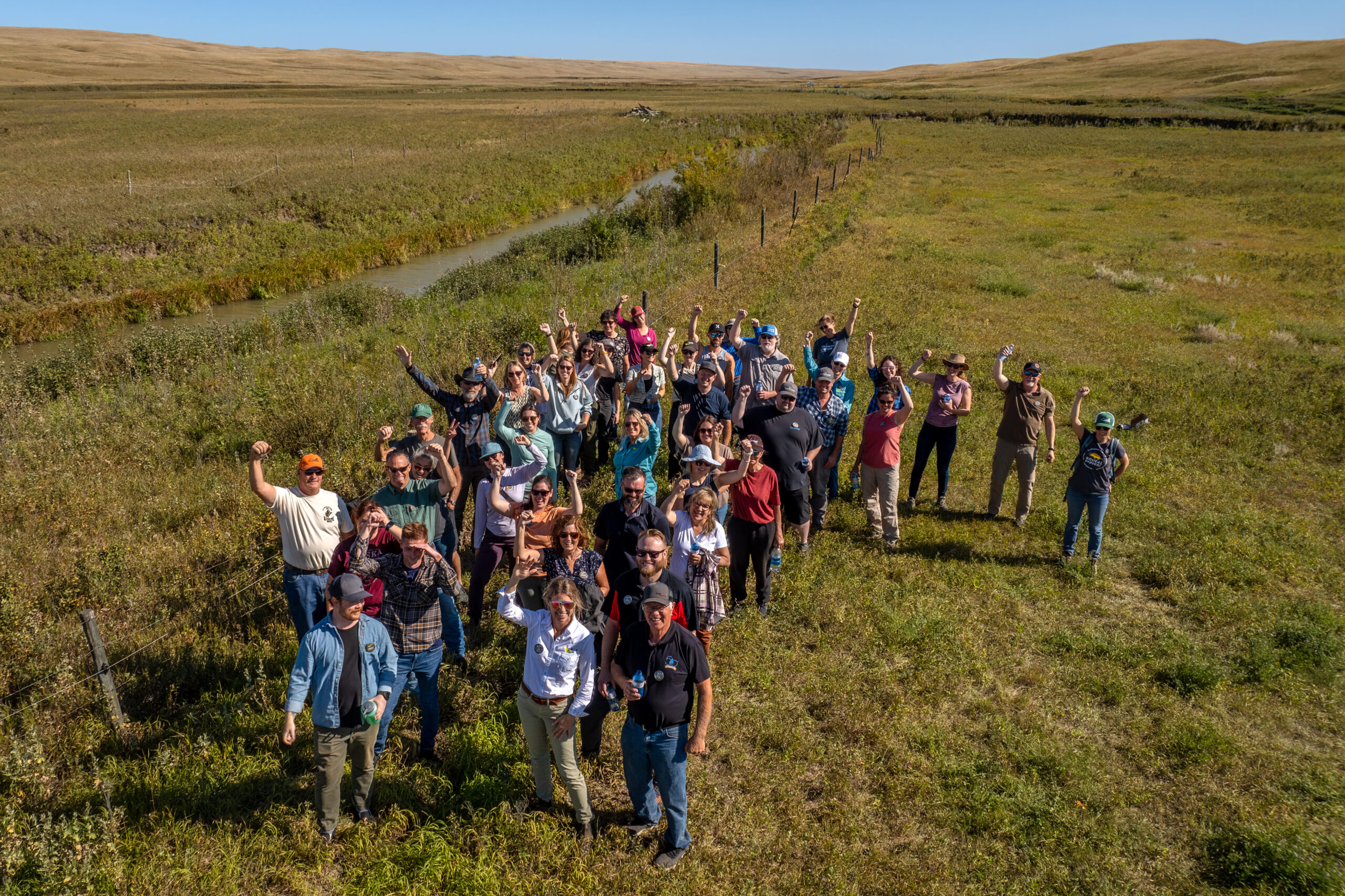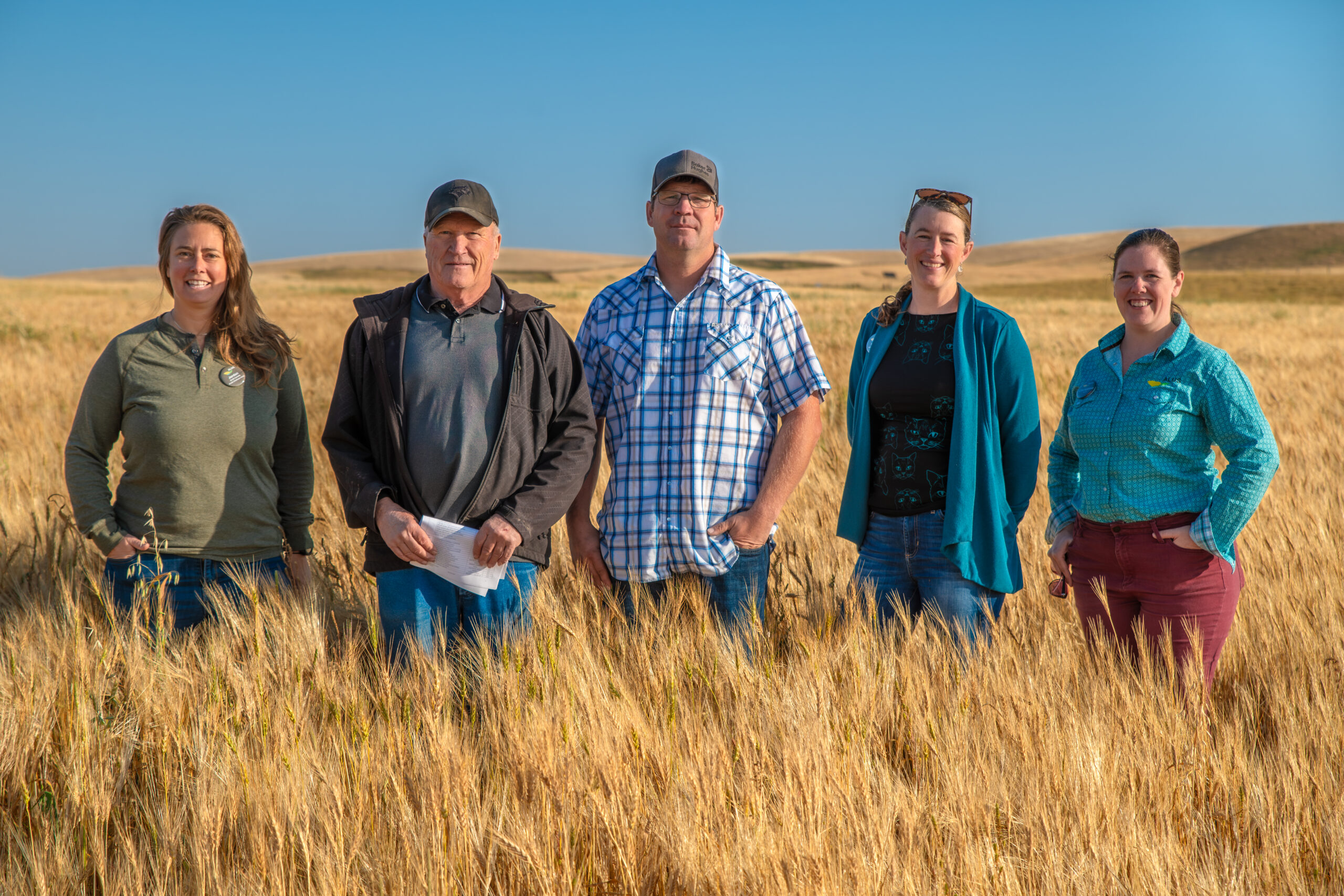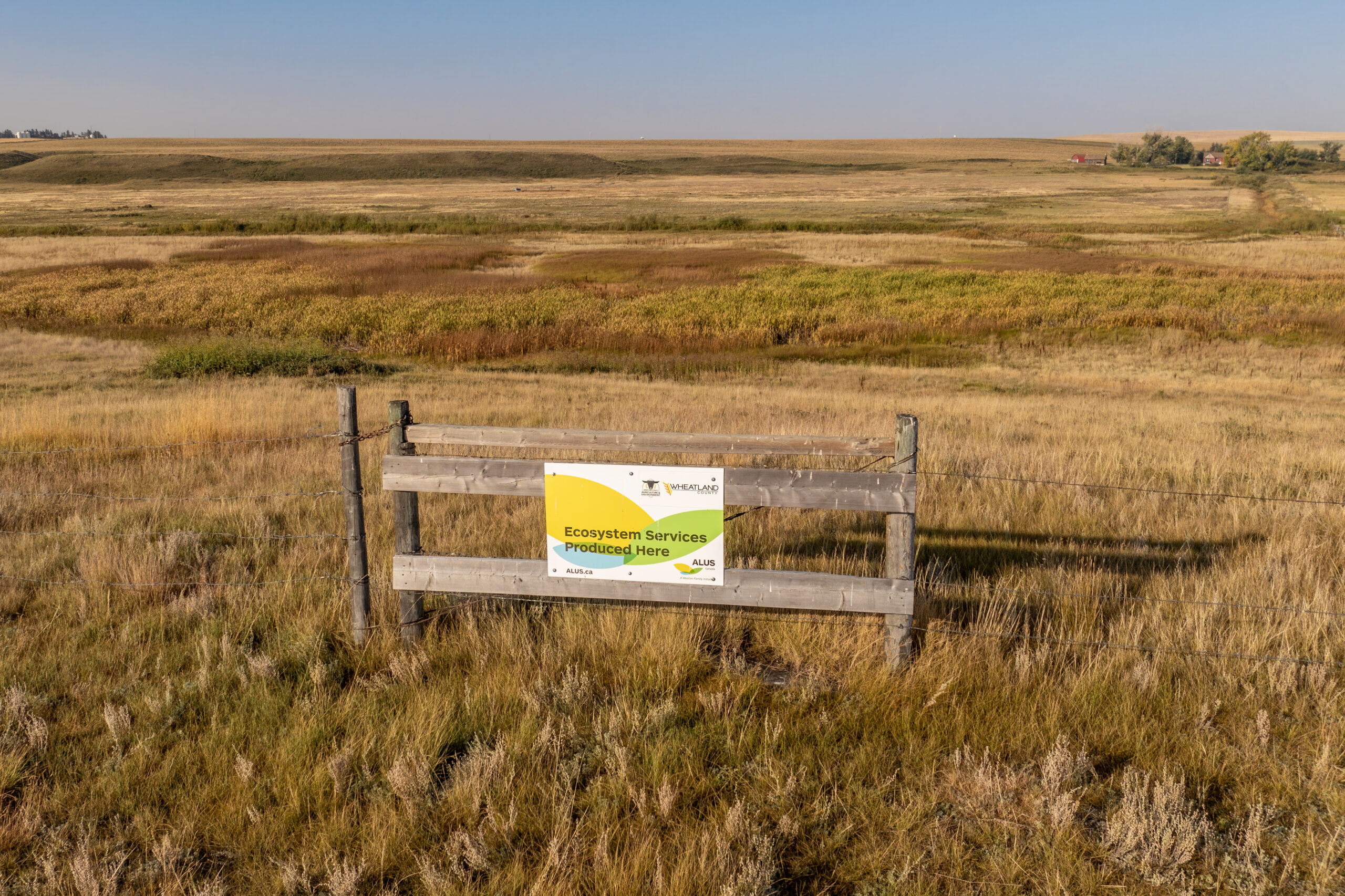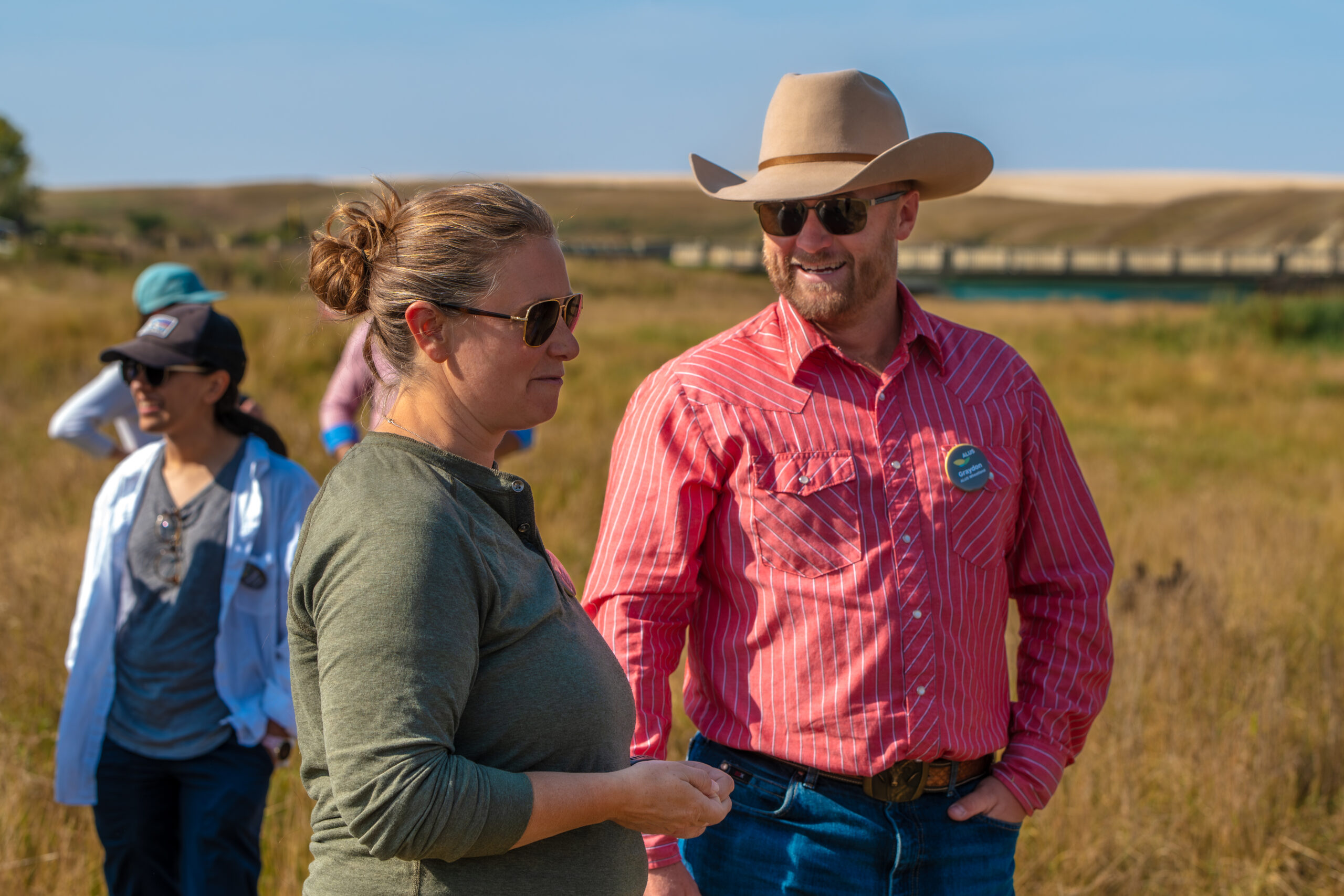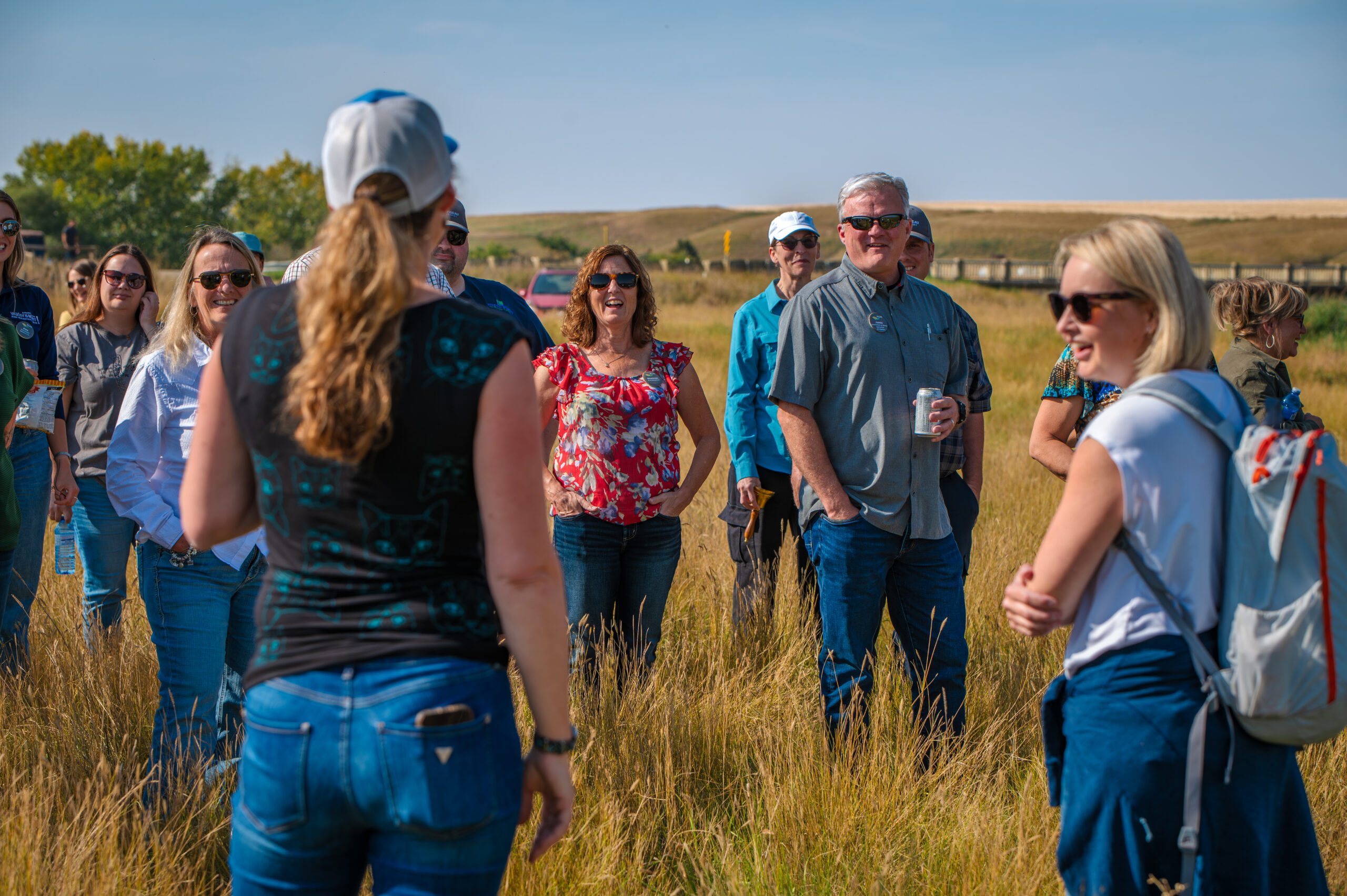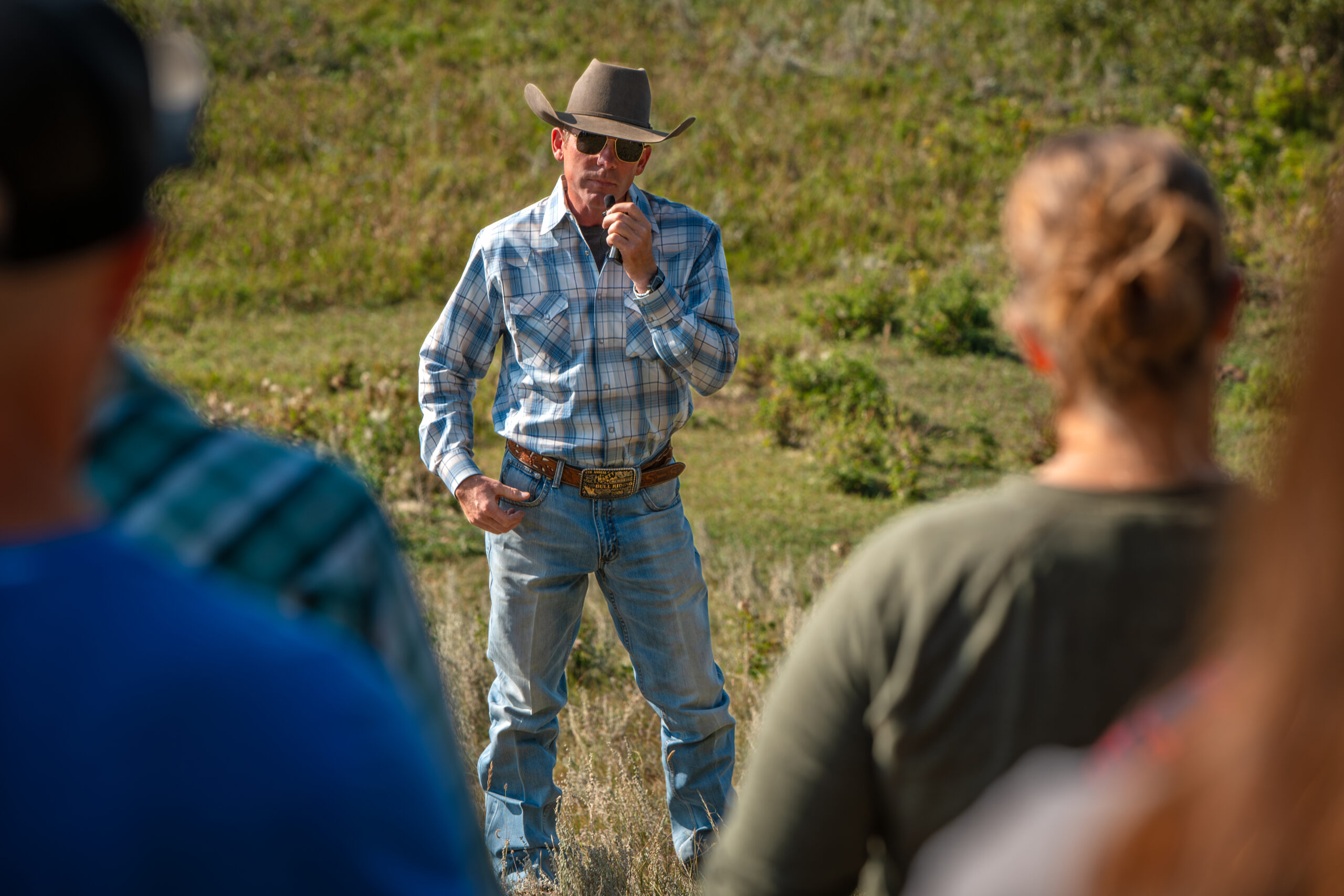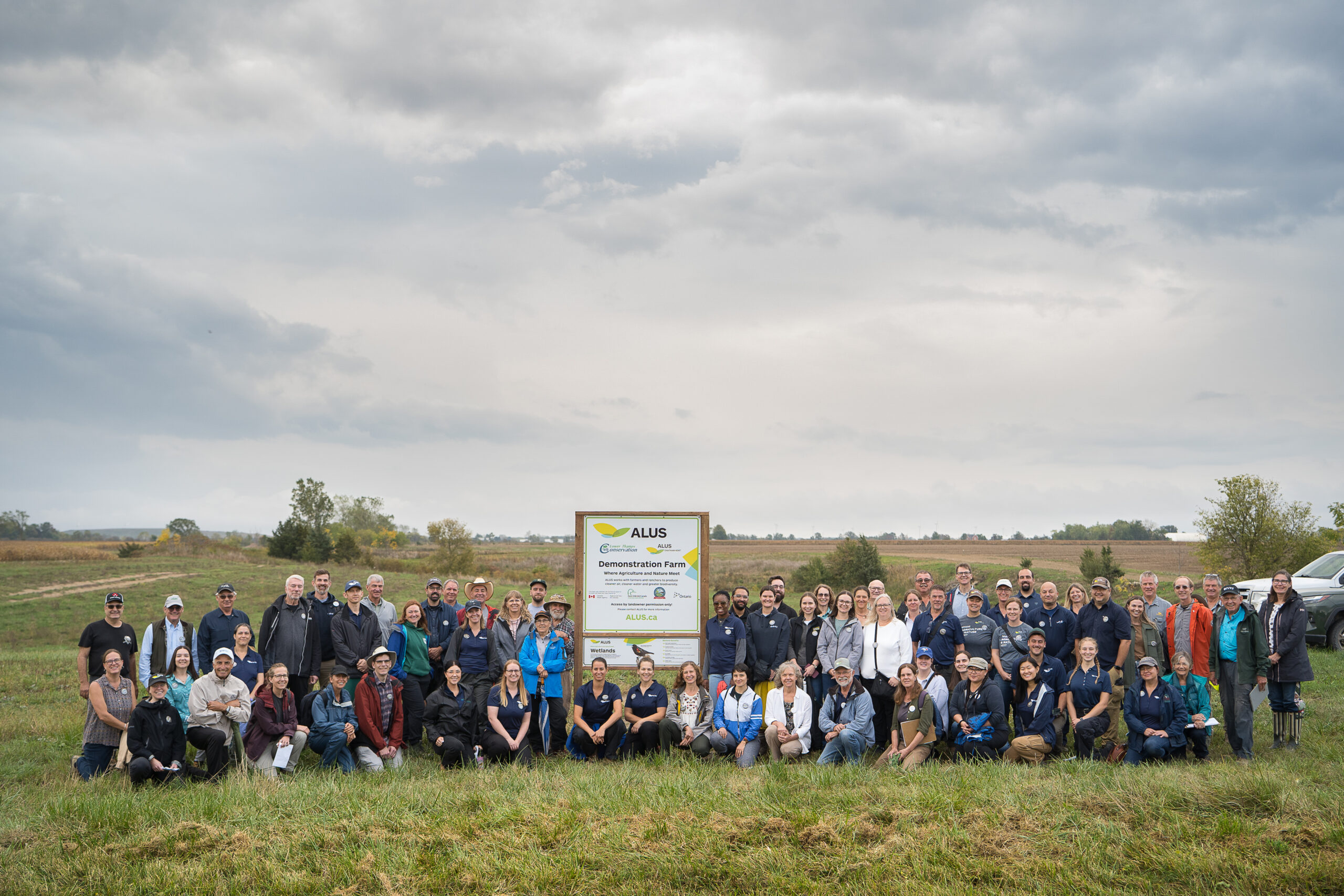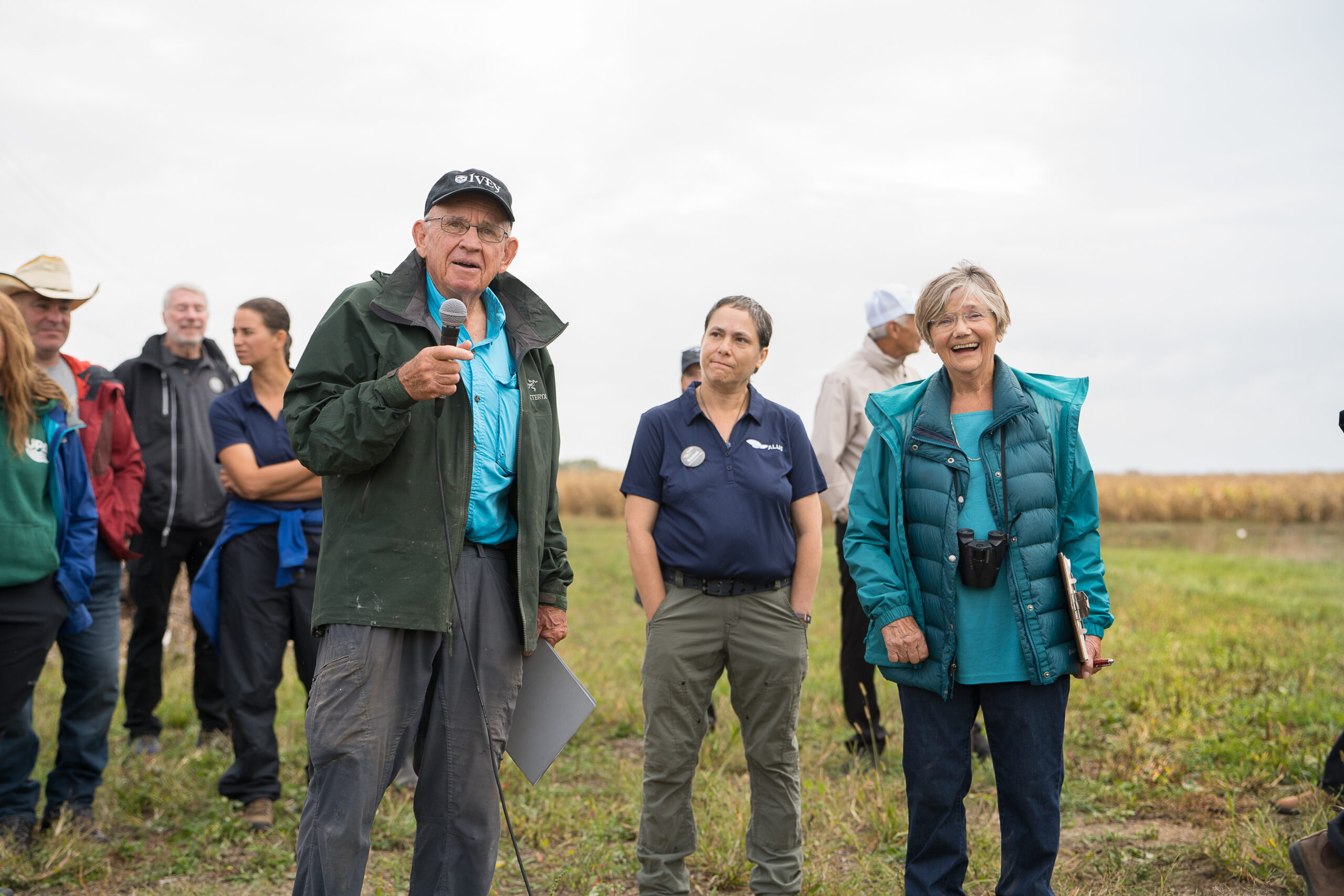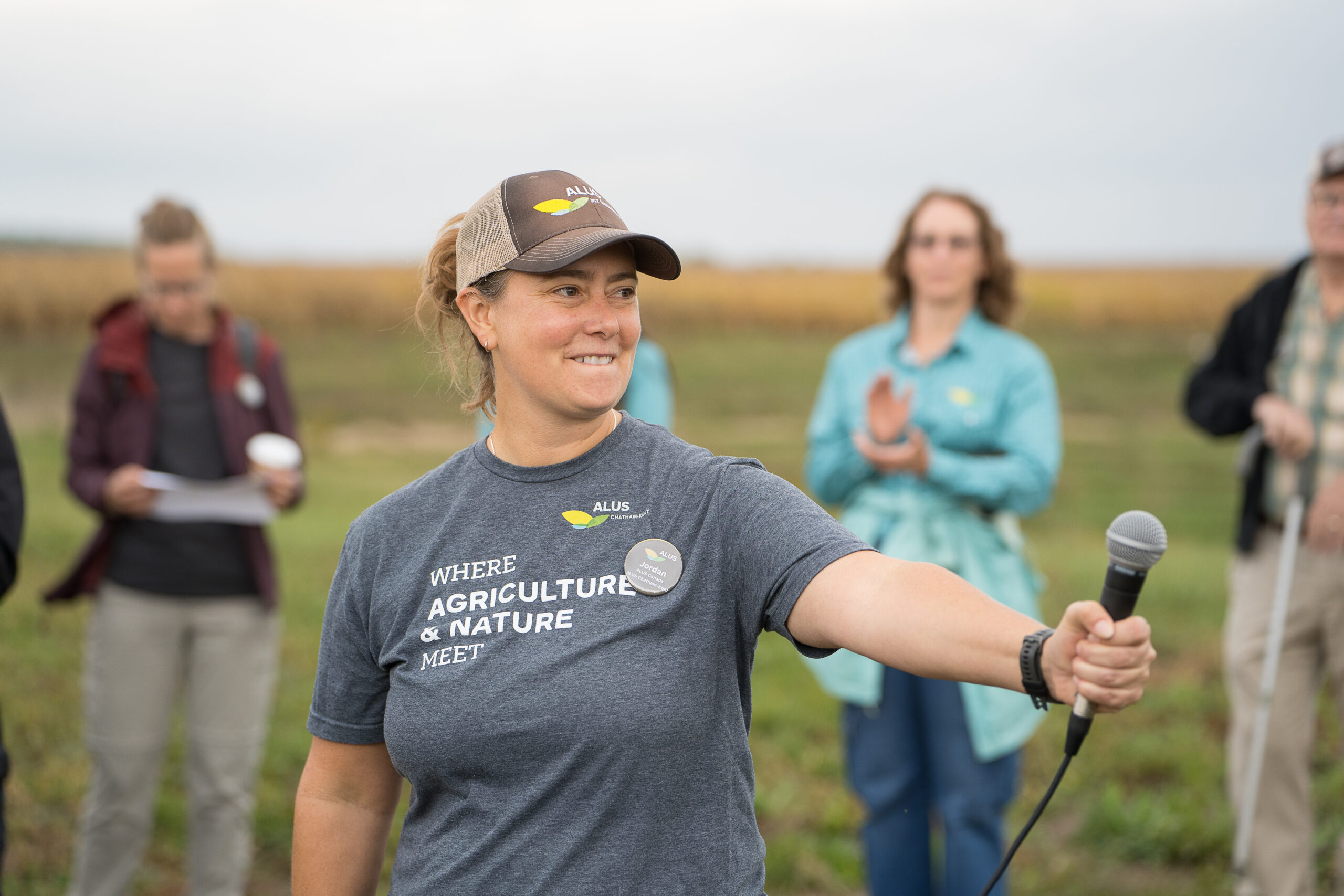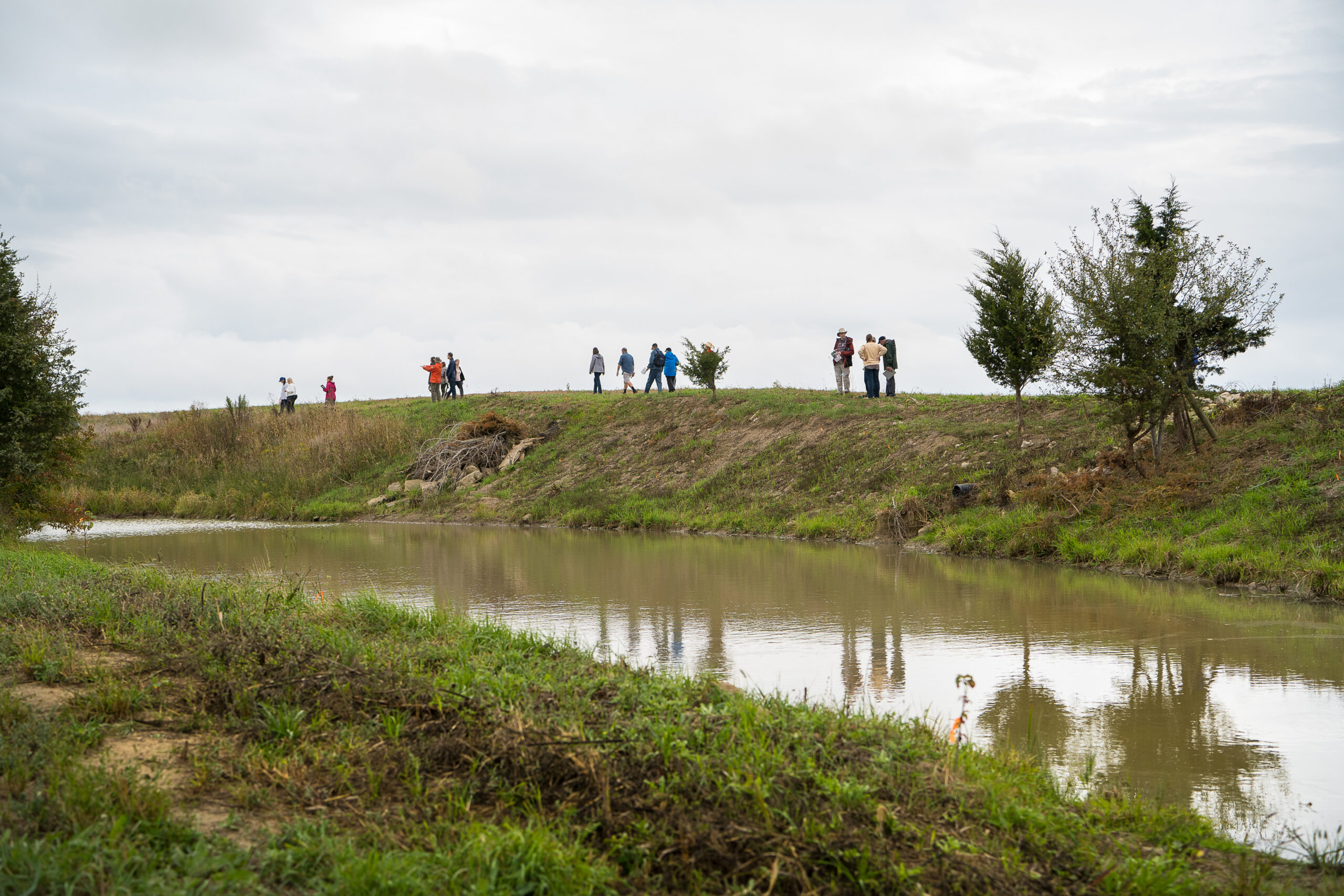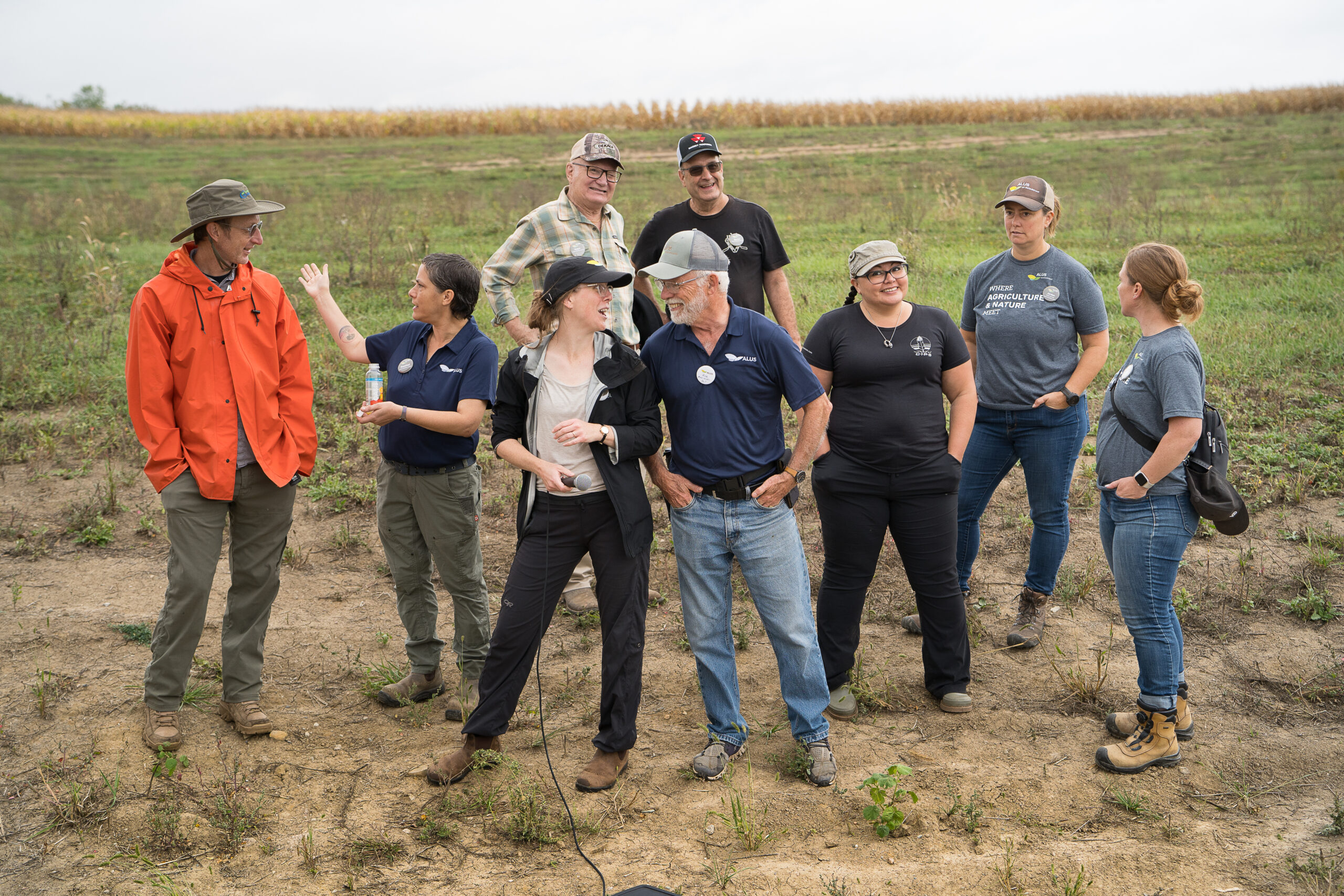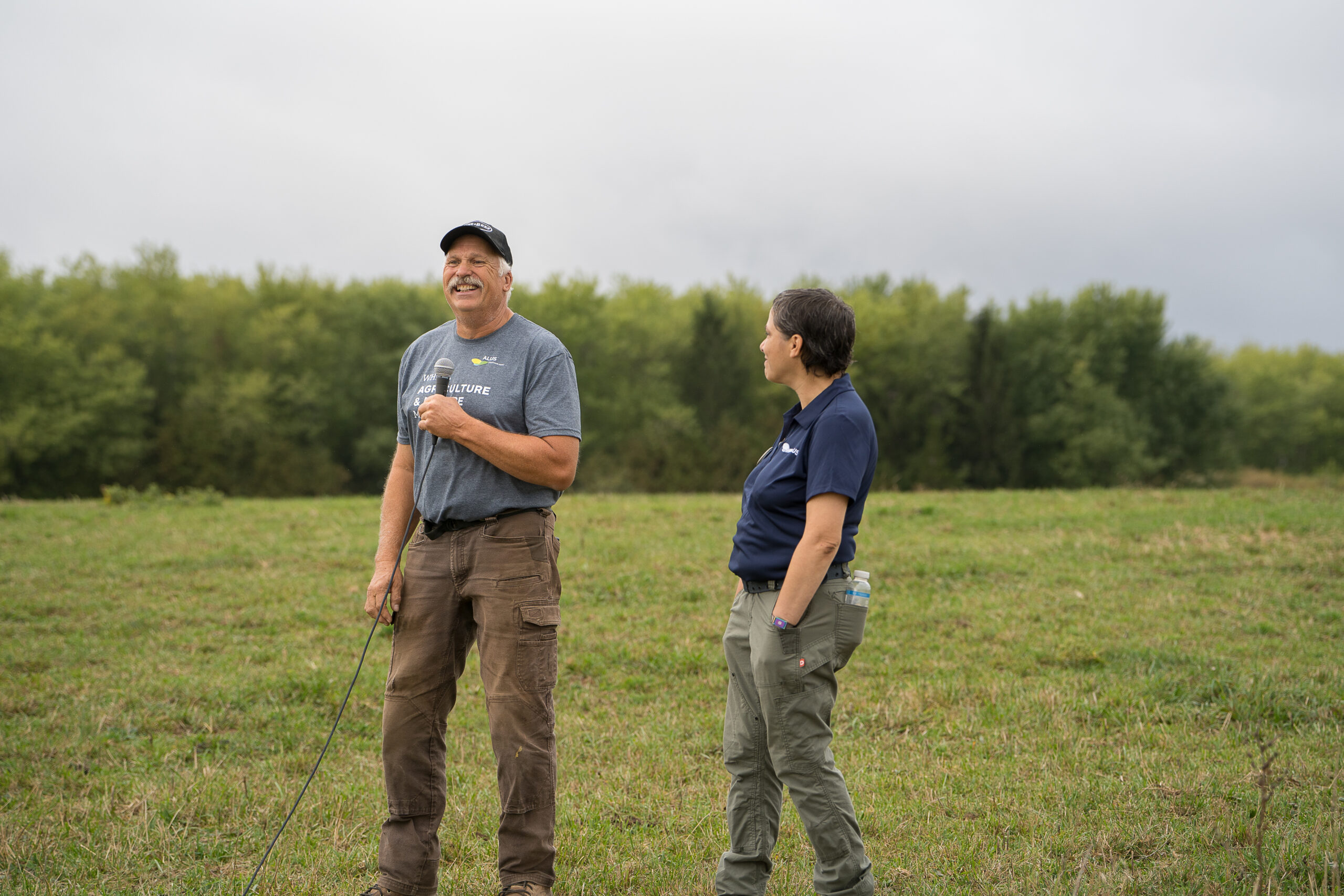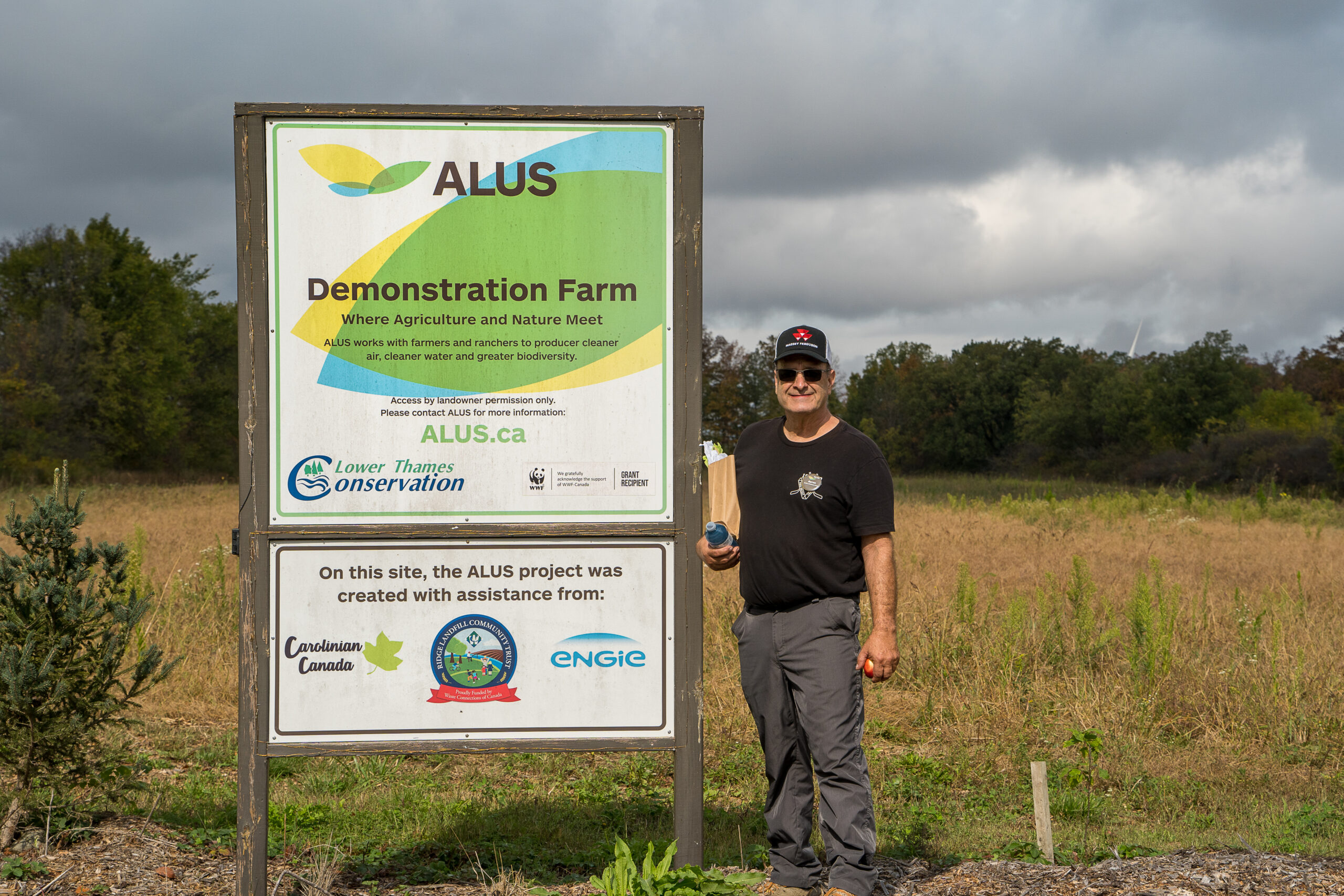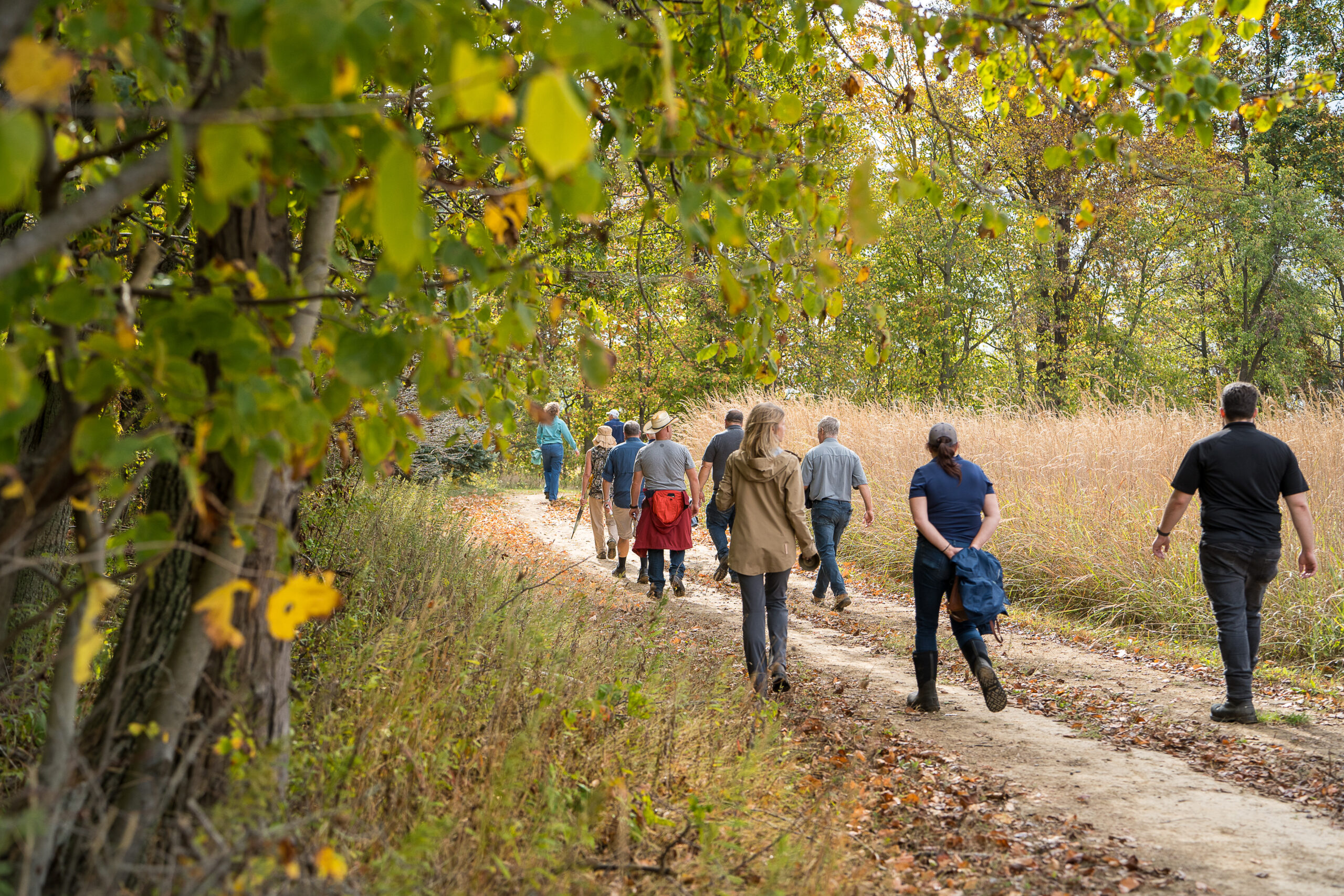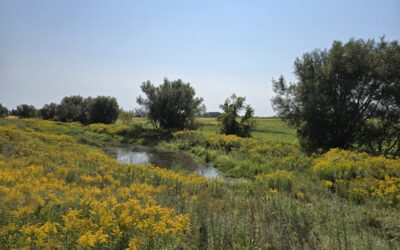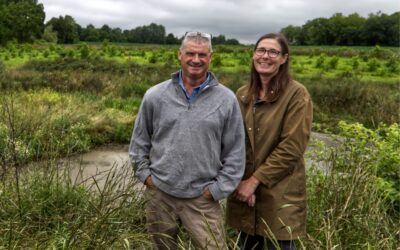From Alberta’s open grasslands to Ontario’s Carolinian forests, the 2025 ALUS Field Conferences showcased what happens when people who care about the land come together. Across both the West and East Hubs, participants shared ideas, celebrated innovation, and strengthened the growing network that drives nature-based solutions across Canada.
West Hub Participants at Springvale Colony, a community-scale bioengineering project that uses live willow cuttings to stabilize eroding banks along the Rosebud River. >> Scroll to see East Hub Participants walking along a renaturalization project on Wolfe Creek Organic Farm.
Gathering Across Regions
Each year, ALUS communities gather to learn, share, and celebrate progress on the land. The 2025 ALUS Field Conferences carried that spirit across the country — from the West Hub Field Conference, hosted by ALUS Wheatland in Alberta, to the East Hub Field Conference, hosted by ALUS Chatham-Kent in Ontario.
Across both events, more than 100 participants from Alberta, Saskatchewan, Manitoba, Ontario, and Québec took part — including ALUS coordinators and national staff, Partnership Advisory Committee (PAC) members, farmers and ranchers, funders, and partners. Each conference brought together its own regional group of participants, reflecting the diversity of ALUS communities across the country. While the gatherings took place thousands of kilometres apart, they shared a common goal: strengthening the relationships and shared learning that drive nature-based solutions on agricultural lands.
A sincere thank-you to RBC for making this year’s Field Conferences possible, with support from Wawanesa Insurance and the Canada Water Agency.
West Hub: Collaboration in the Prairies
Hosted by ALUS Wheatland | Wheatland County, Alberta – September 16–19, 2025
The West Hub Field Conference brought together ALUS communities from Alberta, Saskatchewan, and Manitoba for three days of collaboration and connection. The event began where prairie history and stewardship meet — at Blackfoot Crossing Historical Park, a place of deep cultural significance to the Siksika Nation. The setting offered time for reflection on the enduring relationship between people and the land before two days of hands-on learning and exploration began.
Each day brought half-day classroom sessions, where participants from across the Prairies shared practical insights on tools and resources they value, while ALUS national staff led discussions on leveraging partnerships, fund development, and community engagement. The atmosphere was lively and collaborative — a mix of local experience and shared purpose that defines the ALUS network.
West Hub Participants interact with solar watering system on Clark farm. >> Off site solar watering system. >> West Hub Participants walk towards a riparian restoration on the Crowfoot Creek at the Konschuh farm.
Field tour sessions shifted outdoors, where ALUS Wheatland showcased projects that represent how farmers and ranchers are adapting, innovating, and leading by example.
Starting out at the Clark Farm Project, where exclusion fencing and off-site watering systems protect Crowfoot Creek, improving water quality and habitat while maintaining the rhythm of a working farm. Next, the Konschuh Project showcased how more than five kilometres of fencing, three watering systems, and a new livestock crossing are rebuilding riparian health — with Sprague’s pipit and peregrine falcon sightings marking nature’s approval.
Ryan Greir, Whispering Cedars Ranch, speaking to participants on his family ranch. >> Penny Rolinski, Project Manager ALUS & Shirley McConnell – ALUS Brazeau PAC member along with West Hub Participants on Whispering Cedars Ranch. >> West Hub Participants along a riparian restoration on the Crowfoot Creek at the Konschuh farm.
At Whispering Cedars Ranch, Ryan Greir shared how their family integrates restoration into daily operations: fencing a creek, planting native trees mulched with wool, and installing hawk posts to support raptors. Participants also had an opportunity to tour their enterprise, Solar Sheep Inc., which connect renewable energy and agriculture — showing that stewardship and innovation go hand in hand.
Day 2 started at Circle T Ranch, where Ross and Shaun Collins shared how their 29-acre riparian restoration became a cornerstone of ALUS Wheatland’s early success. Standing before a thriving riparian corridor, Ross offered a line that stayed with everyone:
“ALUS doesn’t make you do anything — it makes you want to do something.”
Jordan Sinclair, CEO ALUS, Ross & Shaun Collins, Circle T Ranch, Sarah Schumacher, ALUS Wheatland Coordinator, Christine Campbell, Senior Hub Manager ALUS on Circle T Ranch.>> Circle T Ranch restored riparian corridor.
At Springvale Colony, a community-scale bioengineering project uses live willow cuttings to stabilize eroding banks along the Rosebud River. With nine acres excluded from grazing and off-site watering installed, the project demonstrates what’s possible when collective action meets ecological design.
Jordan Sinclair, CEO ALUS and Graydon Garner, Canadian Cattle Association along the Rosebud River restoration project. >> Sarah Schumacher, ALUS Wheatland Coordinator and Kelsey Spicer-Rawe, Cows and Fish presenting along the Rosebud River, GOA Jamie Wuite, Executive Director, Natural Resource Management Branch and Wheatland County Councillor, Shannon Laprise. >> S Bar S Ranch on the Serviceberry River, where many ALUS projects have been integrated. >> Scott Schiffner speaks to West Hub Participants on S Bar S Ranch.
The tour concluded at Schiffner’s S Bar S Ranch, where fenced riparian zones along Serviceberry Creek, new crossings, multiple watering systems, and hundreds of native tree and shrub plantings are transforming vulnerable ground into resilient habitat.
As Sarah Schumacher, ALUS Wheatland Coordinator, reflected:
“Every project we visited told a story about community and care. You could feel the spirit of participation — people coming together not because they have to, but because they want to be part of something bigger than themselves.”
Evenings were spent connecting over shared meals and stories, culminating in a celebration at Strathmore Legacy Barn — once a Canadian Pacific Railway demonstration farm that helped newcomers in the early 1900s learn to thrive on the Prairies. There, surrounded by reminders of agricultural heritage, participants reflected on how stewardship continues to evolve. A thought-provoking presentation from The Calgary Zoo highlighted regional conservation efforts, and Neil Claringbould, ALUS Seine Rat Roseau was honoured as a 2025 Dave Reid Award runner-up, recognized for his leadership in his community.
Read more about this year’s Dave Reid Award recipients—Chris and Vivian Crump (ALUS Middlesex), Frédérick Alary (ALUS Laurentides), and Neil Claringbould (ALUS Seine Rat Roseau)—in our feature story.
East Hub: Connection in the Carolinian Region
Hosted by ALUS Chatham-Kent | October 6–8, 2025
A few weeks later, ALUS communities from Ontario and Québec gathered in Chatham-Kent for the East Hub Field Conference, where strong farming traditions meet one of Ontario’s most ecologically diverse landscapes. The region’s Carolinian Zone is a hotspot for biodiversity and species at risk — a fitting setting for conversations about stewardship and resilience.
The day-and-a-half event mirrored the collaborative format of the West, blending field tours with a focused morning of peer learning and evening gatherings for connection and celebration.
East Hub Participants on Wolfe Creek Organic Farm
The tours highlighted three exceptional projects.
At Wolfe Creek Organic Farms, owned by Bob and Moira Kerr, participants explored the Kerr-Wilson Renaturalization Project, where newly created wetlands, prairie buffers, and turtle beaches now protect the Flook & Hinton Drain, bringing fish back to the waterways after years of decline. Reflecting on the transformation, Bob shared:
“It’s true what they say — if you build it, they will come! We’ve had tadpoles, snapping turtles, and fish return in less than one year.”
His words captured the spirit of the entire conference: when people work with nature, nature responds.
Bob and Moira Kerr, Wolfe Creek Organic Farms, speaking about the Kerr-Wilson Renaturalization Project, along with Rashel Tremblay, ALUS Chatham-Kent Coordinator. >> Jordan Sinclair, CEO ALUS passes the mic >> East Hub Participants walk along the Kerr-Wilson Renaturalization Project.
At Mike Buis’ Buis Beef, exclusion fencing and tallgrass prairie buffers help reduce runoff and support pollinators, all while maintaining a thriving fourth-generation farm — proof that productive agriculture and conservation can coexist.
At Gutoskie Farm, Byron Gutoskie showcased test plots of native prairie and a tree demonstration area that are helping refine best practices for long-term restoration — a living classroom for adaptive management.
ALUS Chatham- Kent PAC Members and ALUS & LTVCA Staff. >>Mike Buis’ Buis Beef and Rashel Tremblay, ALUS Chatham-Kent Coordinator >> Byron Gutoski, Gutoskie Farm, an ALUS Demonstration Farm in Chatham. >> East Hub Participants walk through Gutoskie Farm, a living classroom for adaptive agricultural management.
That afternoon, participants were humbled to be welcomed to Walpole Island First Nation for a guided tour of the community’s oak savanna and Carolinian forest, among the most biodiverse landscapes in the country. The visit offered a moment of reflection and gratitude for generations of land care and ecological knowledge.
The next morning, participants gathered for a peer-to-peer exchange, sharing tools and approaches to project planning, communications, and community engagement — a chance to build on what they had seen in the field and strengthen connections across regions. There was an easy energy to the conversations — people connecting across communities, united by a common goal of caring for the land.
As Rashel Tremblay, ALUS Chatham-Kent Coordinator, reflected:
“Each one of us brings a different perspective — but when we gather, we learn from one another. The collaboration that happens in these rooms and fields is what keeps ALUS growing stronger every year.”
The event concluded with a dinner celebrating the 2025 Dave Reid Award winners Chris and Vivian Crump, ALUS Middlesex and runner-up Frédérick Alary, ALUS Laurentides, whose leadership continues to inspire communities across Canada.
Read more about this year’s Dave Reid Award recipients in our feature story.
Reflections from a National Network
From the rolling grasslands of Wheatland County to the fertile soils of Chatham-Kent, the 2025 ALUS Field Conferences reinforced a powerful truth: local leadership drives national impact. Each conversation, farm visit, and shared meal deepened the sense of community that defines ALUS.
Jordan Sinclair, ALUS CEO, reflected:
“When you bring together people who care deeply about their land and communities, incredible things happen. The West and East Hub Conferences are more than events — they’re proof that leadership grows locally, and that collective action is what drives national impact. I’m inspired every time I see our network come together, learning from one another and shaping the future of stewardship across Canada.”
With gratitude to all who participated, hosted, and supported these gatherings — and to RBC, Wawanesa Insurance, and the Canada Water Agency for their generous support — ALUS extends heartfelt thanks to the Wheatland and Chatham-Kent communities, their coordinators (Sarah Schumacher and Rashel Tremblay), PAC members, participants, and partners for exemplifying the collaboration, innovation, and care that make ALUS a truly national movement for nature-based solutions.
2025 Field Conference made possible by
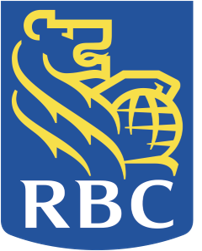
With support from




